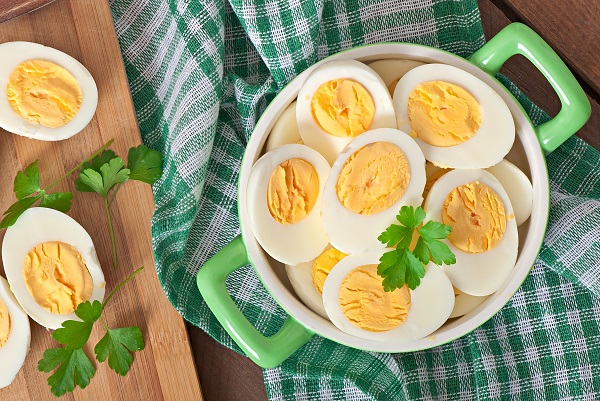101 Healthy Recipes |
|
 When it comes to your breakfast routine or salad toppings, the choice between soft boiled eggs and hard boiled eggs can make a significant difference in your culinary experience. The question of how you like your eggs cooked might seem simple at first glance, but the debate between the creamy, luscious texture of a soft-boiled egg and the firm, hearty bite of a hard-boiled egg is one that's worth exploring. So, which type of egg will win your taste buds over? Let's find out. Texture and Flavor DifferencesSoft-boiled eggs are known for their creamy and delicate texture, in contrast to the firm and robust texture of hard-boiled eggs. The runny yolks of soft-boiled eggs create a velvety consistency, prized for its unique flavor. On the other hand, hard-boiled eggs have firm yolks and whites, offering a sturdy texture suitable for slicing or mashing in various dishes. Making them can be tricky, but online you can find great recipes like How to Make Hard Boiled Eggs. Soft-boiled eggs are recognized for their rich flavor and luxurious mouthfeel, while hard-boiled eggs are valued for their resilience and versatility in cooking. These textural differences cater to a variety of preferences, making both types of eggs essential in different culinary applications. Nutritional ComparisonWhen comparing the nutritional aspects of soft-boiled and hard-boiled eggs, both variations offer similar essential nutrients such as protein, vitamins, and minerals. The cooking method, whether soft or hard boiling, doesn't significantly alter the overall nutrient content of the eggs. While soft-boiled eggs may retain slightly more nutrients due to shorter cooking times, the differences in nutritional value between soft-boiled and hard-boiled eggs are minimal. Both types of eggs are valuable sources of high-quality protein, essential amino acids, and beneficial nutrients. Therefore, whether you prefer your eggs soft-boiled or hard-boiled, you can be confident that you're consuming a nutritious food that can positively contribute to your diet. It's important to adhere to proper cooking techniques for safety and to reduce the risk of foodborne illnesses such as Salmonella. Cooking TechniquesWhen it comes to cooking eggs, the techniques for achieving soft-boiled and hard-boiled eggs differ significantly in terms of cooking duration and outcome. Soft-boiled eggs are cooked for approximately 6-7 minutes, resulting in a partially set white and a runny yolk, ideal for complementing toast or adding richness to salads. In contrast, hard-boiled eggs require a longer cooking time of 10-12 minutes to fully set the whites and yolks. This extended cooking period produces a firm texture suitable for salads, sandwiches, and snacks. The varying cooking times between soft and hard-boiled eggs yield distinct textures, allowing for diverse applications in a range of dishes. Health ConsiderationsIn terms of health considerations, it's important to be mindful of the safety aspects associated with different cooking methods when choosing how to prepare your eggs. Soft-boiled eggs come with a slightly higher risk of salmonella due to their runny yolks, whereas hard-boiled eggs are cooked until both the yolk and white are firm, reducing the risk of foodborne illnesses like Salmonella. Research suggests that there are minimal differences in nutrient levels between soft-boiled and hard-boiled eggs, highlighting the significance of personal preference and safety when deciding on the cooking method. Both types of eggs offer versatile options for meals and snacks, with the texture being influenced by the cooking process while the nutritional value remains relatively consistent. Recipe SuggestionsTo explore the differences between soft-boiled and hard-boiled eggs in cooking, consider trying out various recipes that highlight the unique textures and flavors each type of egg offers.
ConclusionSo next time you're deciding between soft-boiled and hard-boiled eggs, consider your preference for texture and flavor. Remember, both types of eggs offer similar nutritional benefits and can be enjoyed in a variety of recipes. Whether you prefer the creamy richness of a soft-boiled egg or the firm texture of a hard-boiled egg, both options are delicious and versatile sources of protein to add to your meals. Enjoy your eggs!
|
|
Browse Healthy Recipes |